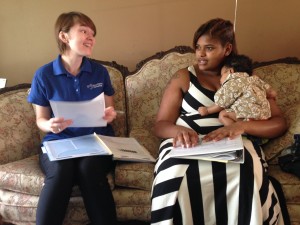Why Education Starts Not In The Classroom, But In The Womb

Claire McInerny / StateImpact Indiana
Máire Flood explains different cues babies give for different needs to new mom Jazmin Smith. The two work together as part of the Nurse Family Partnership, which pairs Medicaid eligible moms with a nurse to learn best practices for raising a child.
Every week, Máire Flood arrives at Jazmin Smith’s home armed with a scale, measuring tape and binders of information about child development. All of this is used to help Smith raise her three-month-old son, Amiri-Jayden.
Flood is a nurse home visitor with the Nurse Family Partnership, an entity of Goodwill Industries that partners Medicaid eligible mothers like Smith with a nurse who helps them through pregnancy up until their child turns two. They talk about everything from what to expect during labor to breastfeeding.
“We also do what are called PIPE lessons,” Flood said. “Which is Partners In Parenting Education, and a lot of those are about being your baby’s first teacher and reading to your baby and picking up on cues and all those kinds of things.”
[audio href=”https://indianapublicmedia.org/stateimpact/files/2014/07/FEABrainDevo_mixdown.mp3″ title=”Stimulating A Baby’s Brain Will Prepare Him Better For Preschool”] The Family and Social Services Administration will announce this month the five counties selected to participate in the state’s new pre-k pilot program, Indiana’s first big move toward making preschool a priority. But many believe a child’s learning needs to be a priority from the beginning of his life, before he ever enters a classroom. StateImpact Indiana’s Claire McInerny reports on the children’s brain development from birth to age four. [/audio]Smith says the parenting skills like breastfeeding, reading daily to her son and knowing what developmental milestones to look for aren’t in line with her own upbringing.
“If I never called Máire, I would probably be listening to my mom and their way of doing things,” Smith said. “He would probably be eating table food. He would probably be doing a lot of things he shouldn’t be doing. I wouldn’t be reading to him, no tummy time cause I didn’t know about all that stuff.”
A Precursor To Preschool
This philosophy of beginning a child’s education from the time he is born is something child development research supports.
A 2012 study from the Center for Early Literacy Learning looked at two groups of toddlers – those who were read to and those who weren’t. The children who were read to developed their language skills earlier than those who were not.
The Family and Social Services Administration will select this month the five counties to participate in the state’s new pre-k pilot program, Indiana’s first big move toward making preschool a priority. But many people, like Riley Child Development Center director Angela Tomlin, knows intervention must happen before preschool.
“And we’re so happy that Indiana is doing more with preschool, but readiness for preschool starts way back in the cradle,” Tomlin said. “People think the baby is born and everything is kind of ready to go. But really, when babies are born their brains are what we call experience expectant and we have certain things that need to happen in order for the babies brain to completely finish up development.”
Some of these experiences include activities that develop a child’s motor skills and getting them familiar with language through reading. Both which help the child developmentally prepare for school.
This is a major focus Flood’s work with Smith and other clients.
The Nurse Family Partnership develops its program around evidence, and Flood says the evidence in favor of reading to children is staggering.
“They said there’s something like a 500,000 word difference between the babies that aren’t read to on a regular basis versus ones that are,” Flood said.
A statistic that resonated with Smith, who now reads to her son every day.